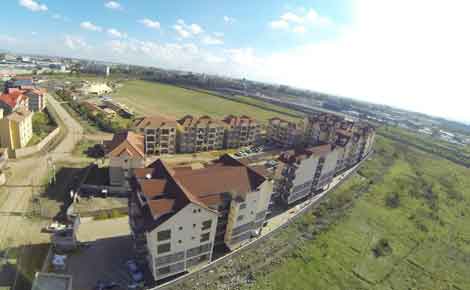 |
|
An aerial view of Imara Daima estate,Nairobi |
NAIROBI, KENYA: Many urban dwellers seeking to buy or rent houses are increasingly asking for more when deciding where to live.
Forget those inviting descriptions in colourful brochures and websites of the hundreds of ‘good living’ properties that have cropped up everywhere.
People are looking for more than polished kitchen counters, large family rooms, wall-to-ceiling wardrobes, picket fences and well-manicured lawns.
For Mercy Murugi, an award-winning film producer, her dog was a major factor when she was deciding where she would live next.
“I was living in an apartment on Riara Road, Nairobi, and the dog was an issue. It was restrained and letting it wander out of the building was a thought I could not entertain,” she says. “I had to get my own compound to accommodate its energy.”
Living with more than 50 other people also made her feel “claustrophobic”. Now living in a mansion in a leafy neighbourhood in Langata, she says she wanted privacy.
“I do not even know who my next door neighbour is. It does not matter, anyway, because I would not like them to be on my case,” she said.
Security
Murugi, a car-lover, says security is also key and she avoids neighbourhoods with high carjacking rates. Proximity to shopping centres also ranks high on her list of factors to consider.
“I have to live within a 15-minute drive to a large shopping centre. I prefer to have large supermarkets within my locality,” said Murugi, adding: “Sometimes, I get home very late due to the irregular hours I work. A neighbourhood with no late night food joints is not convenient for me.”
For many singles, a shopping centre in the neighbourhood means access to ready-made food, a necessity for a group that spends most of their time out of the kitchen.
For others, the details of the house are not as important as the availability of a ‘ka-local’ where beer or other alcoholic drinks can be drank with the knowledge that one is a stone’s throw away from home and is safe when staggering to bed.
Others will live next to bars or sports lounges to catch their favourite sport without having to cross town to enjoy a game. Some will live in neighbourhoods they can brag about to their friends about.
Personality
Others, like Christabel Wahu, choose their neighbourhoods based on their personalities.
Stay informed. Subscribe to our newsletter
“I am a very impatient lady and I hate queues. There is no way I will live in a place where I have to stand in a queue in the morning and in the evening. I would rather live out of town than where I won’t be forced to waste time waiting for transport,” says the mother of one, who lives in Kiambu.
Long queues can always be spotted across Nairobi city every evening with some going around a whole block. Passengers of all sexes and ages can be spotted busy on their phones, chatting among themselves or looking gloomy. Wahu is not attracted to this kind of scenario. Other considerations, like electricity, are more serious. Solomon Nampiyu, a young Nairobian, has moved houses twice in a span of six months because of his passion.
“I am either checking out stuff on my two laptops or playing video games. I need constant electricity supply,” says Nampiyu, who decided to move into an apartment in Lavington, which has a back-up generator.
Power needs
“I will tell you for a fact that Kenya Power distributes electricity very differently around the city. You just have to check out the tweets people send to Kenya Power’s account to know which estates suffer most,” he says.
To Anthony Mutua, one-stop shopping will always influence where he lives. The public relations practitioner, who recently moved houses, explains that a mall offers more for him.
“I prefer living next to a mall. You can do a lot in a mall. It is like a one-stop shop and due to my busy schedule, I do not have time to go shopping anywhere else except in a mall,” Mutua explains.
According to Duncan Amalemba, an agent with Mombasa-based Salyani Properties, besides the usual security and accessibility to amenities demands made by most urban clients, there will always be an odd request.
“The most curious case was that of one prospective tenant who made sure the building we got for him had taxi service, especially at night,” says Amalemba.
But he says that even with these odd considerations, occupancy will almost always be determined by the size of the prospective renter’s pocket.
“Even with all the odd preferences, the budget of the aspiring tenant will always take precedence,” Amalemba explains.
 The Standard Group Plc is a
multi-media organization with investments in media platforms spanning newspaper
print operations, television, radio broadcasting, digital and online services. The
Standard Group is recognized as a leading multi-media house in Kenya with a key
influence in matters of national and international interest.
The Standard Group Plc is a
multi-media organization with investments in media platforms spanning newspaper
print operations, television, radio broadcasting, digital and online services. The
Standard Group is recognized as a leading multi-media house in Kenya with a key
influence in matters of national and international interest.
 The Standard Group Plc is a
multi-media organization with investments in media platforms spanning newspaper
print operations, television, radio broadcasting, digital and online services. The
Standard Group is recognized as a leading multi-media house in Kenya with a key
influence in matters of national and international interest.
The Standard Group Plc is a
multi-media organization with investments in media platforms spanning newspaper
print operations, television, radio broadcasting, digital and online services. The
Standard Group is recognized as a leading multi-media house in Kenya with a key
influence in matters of national and international interest.





